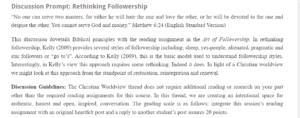Rethinking Followership
Drawing from your personal professional experience as a follower, what style do you tend to adopt? Do you tend to stick with one style or do you change styles depending on the leader? Kelly (2009) asks, “Can a person be a star follower in one situation and an alienated follower in another” (p. 8).
The question about followership is quite difficult for me. I looked at the different followership styles, and I cannot honestly say that I fall into one specific category. When I look at the descriptions given by Kelley, I am of the opinion that the definitions given are not absolute. That said, I can categorize myself as both an alienated follower and an exemplary follower as well. This is because I do not blindly follow a leader’s prompting when I know that whatever direction is given by the leader is against my gut feeling. Sometimes my gut feeling is wholly right and sometimes partially right; whichever the case, I have come to rely on it as a good indication of the direction to take. To be more specific, I believe, as a Christian and a firm believer, in the guidance of the Holy Spirit, it is not just a gut feeling, but instead, I believe it is the still, small voice that most describe as a gut feeling. The apostle Paul experienced the same in and through a dream in Acts 16:6-10 (NIV):
6 Paul and his companions traveled throughout the region of Phrygia and Galatia, having been kept by the Holy Spirit from preaching the word in the province of Asia. 7 When they came to the border of Mysia, they tried to enter Bithynia, but the Spirit of Jesus would not allow them to. 8 So they passed by Mysia and went down to Troas. 9 During the night Paul had a vision of a man of Macedonia standing and begging him, “Come over to Macedonia and help us.” 10 After Paul had seen the vision, we got ready at once to leave for Macedonia, concluding that God had called us to preach the gospel to them.
Therefore, when a situation arises where a leader requires me to follow instructions given without question, I choose to be an alienated follower based wholly on the guidance of the Holy Spirit. On the other hand, when the way is clear on what direction should be taken, I tend to be an exemplary follower. I work at excelling in whatever task given while engaging strongly with the team members. I do this while also providing my leaders with sensitive and intelligent challenge and support.
In answering the question posited by Kelley, a person can be a star follower and also an alienated follower (Crossman & Crossman, 2011). As aforementioned, that has happened to me, and I am possibly going to find myself in many more situations that require my followership to adapt to the specific situation.
References
Crossman, B., & Crossman, J. (2011). Conceptualising Followership–A Review Of The Literature. Leadership, 7(4), 481-497.
Kelley, R. E. (2008). Rethinking Followership. The Art Of Followership: How Great Followers Create Great Leaders And Organizations, 5-16.
ORDER A PLAGIARISM-FREE PAPER HERE
We’ll write everything from scratch
Question 
Discussion Prompt: Rethinking Followership
“No one can serve two masters, for either he will hate the one and love the other, or he will be devoted to the one and despise the other. You cannot serve God and money.” Matthew 6:24 (English Standard Version)

Rethinking Followership
This discussion dovetails Biblical principles with the reading assignment in the Art of Followership. In rethinking followership, Kelly (2009) provides several styles of followership including; sheep, yes-people, alienated, pragmatic and star followers or “go to’s”. According to Kelly (2009), this is the basic model used to understand followership styles. Interestingly, in Kelly’s view this approach requires some rethinking. Indeed it does. In light of a Christian worldview we might look at this approach from the standpoint of restoration, reintegration and renewal.
Discussion Guidelines: The Christian Worldview thread does not require additional reading or research on your part other than the required reading assignments for this course. In this thread, we are creating an intentional space for authentic, honest and open, inspired, conversation. The grading scale is as follows; integrate this session’s reading assignment with an original heartfelt post and a reply to another student’s post assures 20 points.
Discussion:
Consider the following questions: Drawing from your personal professional experience as a follower, what style do you tend to adopt? Do you tend to stick with one style or do you change styles depending on the leader? Kelly (2009) asks, “Can a person be a star follower in one situation and an alienated follower in another” (p. 8).
Select one or more questions and post your comments here applying the scripture cited above. Please respond to at least one of your classmate’s posts.
Please complete the following before this session:
Reading:
Riggio, R. E., Chaleff, I., & Lipman-Blumen, J. (2008). The art of followership: How great followers create great leaders and organizations. Forward, Introduction, and Part I

